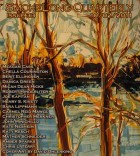I admit I’m not usually drawn to the short, staccato sentences you use to construct your story, but on the second read, you drew me in. After selecting the flash and discovering your name, I did a Google search and found other flashes online that show you experiment with voice and style. What made you go with these short sentences to tell this particular story?
I’m not sure. It probably had something to do with the sentence “I may have called them idiots.” After that sentence, I remember I had to backhoe quite a bit of the other work. I didn’t realize the father would say this. I didn’t necessarily expect it to come out of his mouth. But, there it was on the page and it seemed okay to me. So, I reshaped a good bit to better fit the sort of person who says this sort of thing and says such a thing in this way.
It worked. There is much that I love about this flash. For one, the images are powerful and resonate for days after reading. I think the strongest image is of the “friends” sliding along the floor in their feety pajamas in the frigid, Swedish, glass igloo bar. Can you tell us what inspired this story? An event, image, or idea?
This piece comes from a collection I’m right now calling A Scandamerican Domestic. It’s a study of American domestic narratives and Swedish and Scandinavian-American history. I spend a good bit of time reading about Sweden and Swedish-American history and culture, and I write about it a lot, also. At the time I was drafting this particular story, I was reading Moberg’s The Emigrants, and I think I sort of just took that novel and spun it bizarro-style—inversed the transatlantic movement, sent everyone back, squished three hundred thousand words into about seven hundred, confused all the rural settlers by dropping them in an upscale urban Eden.
I was thrown off in the first cursory read by your quick switch to the use of “friends” to refer to the children. What was behind your decision to do this, and did you worry at all about confusing the reader?
Probably one of the most well-known lines in DeLillo’s White Noise is the narrator’s suggestion that “the family is the cradle of the world’s misinformation.” I love this line and the whole discussion he has on the idea that “the family process works toward sealing off the world.” The tighter and closer a family gets, the more it pulls back from the objective facts of the world it inhabits . . . this just seems to make total sense to me. Most parents I know—myself included—both fear and desire friendship with their children. It’s a real psychological mess.
I certainly hoped the narrator’s understanding of and searching for “friendship” would sit outside the world’s “objective facts” enough to confuse or upset a reading. But I also tried to reiterate the point throughout, to make it clear that, objectively speaking, our narrator was operating in one of these isolated familial sphere’s DeLillo’s narrator knows so well.
At any rate, I think if I was worried about anything, I was worried I wouldn’t be confusing enough on this particular point. I was worried it wouldn’t seem out of step enough to halt a reading.
There is an underlying current of humor and tragedy that you manage to pull off concurrently. Not an easy task. Did you intend to include both, or did these tones just emerge?
Barthelme’s “The Baby” is one of my all-time favorites. It has this amazing paragraph: “The baby’s name was Born Dancin’. We gave the baby some of our wine, red, white and blue, and spoke seriously to her. But it didn’t do any good.” I think this is pretty much the center of the bull’s-eye for me. If I can get anywhere near these sentences and this sentiment and style, I’m going to go away and have a peaceful night’s sleep.
I could ask many questions about this wonderful story, it’s so layered. And I hope readers will look at it more than once to peel away those layers. But to wrap up, what is it about flash that made you tell this story in this brief form?
You are very kind. I’m glad the piece feels layered. That is a nice compliment. I guess my response to your question about the draw of flash would have to involve the issue of humor. I just doubt that this story retains any sense of humor if it goes longer. If it goes any longer, I think, it becomes increasingly dire. It may already go too long.



 The core workshop of SmokeLong Fitness is all in writing, so you can take part from anywhere at anytime. We are excited about creating a supportive, consistent and structured environment for flash writers to work on their craft in a community. We are thrilled and proud to say that our workshop participants have won, placed, or been listed in every major flash competition. Community works.
The core workshop of SmokeLong Fitness is all in writing, so you can take part from anywhere at anytime. We are excited about creating a supportive, consistent and structured environment for flash writers to work on their craft in a community. We are thrilled and proud to say that our workshop participants have won, placed, or been listed in every major flash competition. Community works.